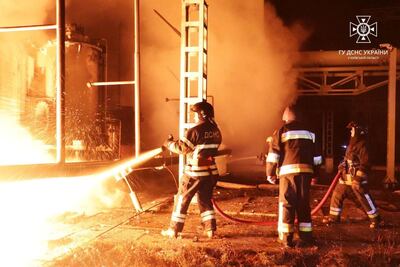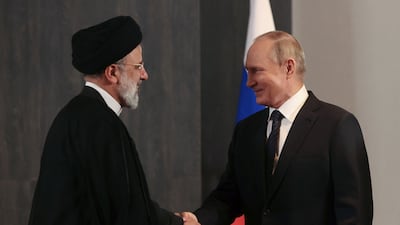Western sanctions on Russia over its invasion of Ukraine have left a “huge gap”, allowing Moscow to benefit from strengthening ties with Iran, it has been claimed.
Britain, the US and the European Union, among others, have placed tough penalties on individuals and entities closely tied to the Kremlin in a bid to deprive the Russian war machine of vital funds.
But since Russian tanks rolled into Ukraine in February, President Vladimir Putin’s government has cosied up to Iran.
For the past few weeks, Russia has been using drones laden with explosives to attack infrastructure in Ukraine. Western analysts have said these drones were made in Iran, a claim which both Moscow and Tehran have denied.
Paul Radu, co-founder and director of the Organised Crime and Corruption Reporting Project, said if sanctions had been issued in a different manner, they could have prevented Russia and Iran from growing closer.
“We are seeing Russia, Iran, China … working together to some degree,” he said.
“The fact that Iran can operate with Russia right now shows that there are huge gaps in the sanctions regimes.”
As the two nations form closer ties, he said “we are seeing very intense co-operation between Iran and organised crime”.

Mr Radu was speaking at an online event organised by the International Institute for Strategic Studies about the rise of criminal states and the implications for global security.
Asked by The National how the West could prevent Russia from benefiting from dealing with Iran, Mr Radu pointed to the US Enablers Act. If passed into law, it would expand on the types of institutions required to comply with anti-money laundering requirements under the existing Bank Secrecy Act.
He said the Enablers Act had the potential to bring about a “big change” to the way in which criminal states and organisations benefit from dealings with people and firms overseas. Mr Radu did not mention specific actions that the UK and its European allies could take.
“The minimum we can do, as the international community is to continue with pinpointing sanctions, these type of Magnitsky sanctions, where you target officials rather than large parts of the population,” he said.
“But what really is needed is to understand how … enablers in the West are aiding and abetting these type of activities.”
Mr Radu added that this type of activity has been going on for decades.
“It's not that now these countries are becoming criminal, they have been criminal for a long, long time,” he said.
“It's only that we're seeing more and that's good.”
Once a problem has been identified, he said, it can be addressed.
“I think we're at the stage where we're trying to understand as best as possible how these sanctions are avoided by these countries, how Iran is able to co-operate with Russia, and [for] military [support] right now, it seems to be with Syria, for instance,” Mr Radu continued.
“All these avenues for organised crime and corruption are what Russia and Iran are using to their full extent.”
He recalled how he was confronted by an Iranian official in Rome after speaking at a Nato event about the large role money-laundering systems play in Iran.
“He said, ‘Look, you're actually wrong about your assumptions, about Iran being such an evil state because the people that we asked to help us, they robbed us as well,” he said.
“So criminals have no allegiance, criminals have no respect of countries.”


